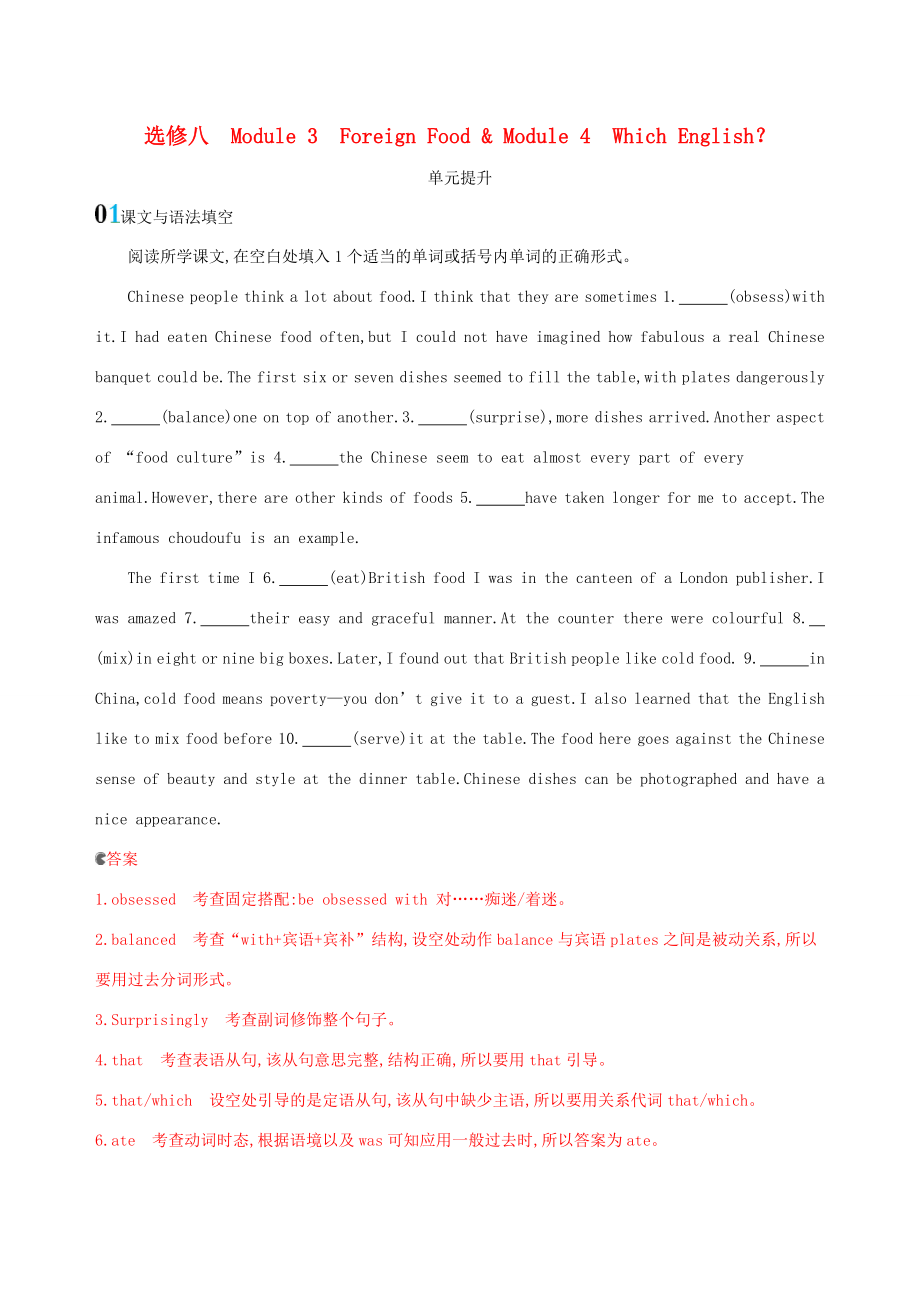《高考英語一輪復(fù)習(xí) Module 3 Foreign Food Module 4 Which English單元提升 外研版選修8-外研版高三選修8英語試題》由會員分享,可在線閱讀����,更多相關(guān)《高考英語一輪復(fù)習(xí) Module 3 Foreign Food Module 4 Which English單元提升 外研版選修8-外研版高三選修8英語試題(3頁珍藏版)》請在裝配圖網(wǎng)上搜索。
1����、選修八 Module 3 Foreign Food & Module 4 Which English?
單元提升
課文與語法填空
閱讀所學(xué)課文,在空白處填入1個適當(dāng)?shù)膯卧~或括號內(nèi)單詞的正確形式����。
Chinese people think a lot about food.I think that they are sometimes 1. (obsess)with it.I had eaten Chinese food often,but I could not have imagined how fabulous a real Chinese banquet could be
2����、.The first six or seven dishes seemed to fill the table,with plates dangerously 2. (balance)one on top of another.3. (surprise),more dishes arrived.Another aspect of “food culture”is 4. the Chinese seem to eat almost every part of every animal.However,there are other kinds of foods 5. have t
3����、aken longer for me to accept.The infamous choudoufu is an example.?
The first time I 6. (eat)British food I was in the canteen of a London publisher.I was amazed 7. their easy and graceful manner.At the counter there were colourful 8. (mix)in eight or nine big boxes.Later,I found out that Bri
4、tish people like cold food. 9. in China,cold food means poverty—you don’t give it to a guest.I also learned that the English like to mix food before 10. (serve)it at the table.The food here goes against the Chinese sense of beauty and style at the dinner table.Chinese dishes can be photographed
5����、and have a nice appearance.?
答案
1.obsessed 考查固定搭配:be obsessed with 對……癡迷/著迷。
2.balanced 考查“with+賓語+賓補”結(jié)構(gòu),設(shè)空處動作balance與賓語plates之間是被動關(guān)系,所以要用過去分詞形式����。
3.Surprisingly 考查副詞修飾整個句子。
4.that 考查表語從句,該從句意思完整,結(jié)構(gòu)正確,所以要用that引導(dǎo)����。
5.that/which 設(shè)空處引導(dǎo)的是定語從句,該從句中缺少主語,所以要用關(guān)系代詞that/which。
6.ate 考查動詞時態(tài),根據(jù)語境以及was可知應(yīng)用
6����、一般過去時,所以答案為ate。
7.at 考查固定搭配:be amazed at sth.對……感到驚訝����。
8.mixtures 此處謂語動詞是復(fù)數(shù)形式were,所以要用名詞的復(fù)數(shù)形式:mixtures����。
9.But 根據(jù)前后兩句話意思可以斷定它們之間是轉(zhuǎn)折關(guān)系,應(yīng)該用連詞but����。
10.serving 考查非謂語動詞。設(shè)空處動作與其邏輯主語之間是主動關(guān)系,所以要用v.-ing形式����。
話題知識與寫作
根據(jù)下面的素材,用本模塊所學(xué)詞匯和句式結(jié)構(gòu)完成句子����。
1.他曾經(jīng)是一個優(yōu)秀的學(xué)生,但在沉迷于網(wǎng)絡(luò)游戲后情況完全改變了。
?
2.他浪費了太多寶貴的時間,而這些時間應(yīng)該是他用來
7����、在教室里學(xué)習(xí)的。結(jié)果,他的學(xué)習(xí)落在了后面����。
?
3.他的狀況如此糟糕,難怪他的父母為他如此擔(dān)心。
?
4.因此,他們決定不管付出多大代價,也要盡他們所能讓他遠(yuǎn)離網(wǎng)絡(luò)游戲����。
?
5.在他的父母的幫助下,他改掉了那個壞習(xí)慣����。
?
【聯(lián)句成篇】把以上句子聯(lián)成短文,要求銜接連貫����、過渡自然。
?
?
?
?
?
答案
1.He used to be a top student,but after he was obsessed with online games,things changed completely.
2.He wasted too much precio
8����、us time which he should have made use of to study in the classroom.As a consequence,he got left behind in his study.
3.He was in such a mess.No wonder his parents were so concerned about him.
4.So they decided to do everything they could to keep him away from the online games,whatever the cost was
9、.
5.With his parents’ help,he got rid of the bad habit.
One possible version:
He used to be a top student,but after he was obsessed with online games,things changed completely.He wasted too much precious time which he should have made use of to study in the classroom.As a consequence,he got left
10����、behind in his study.He was in such a mess.No wonder his parents were so concerned about him.So they decided to do everything they could to keep him away from the online games,whatever the cost was.With his parents’ help,he got rid of the bad habit.
單元詞匯拓展速記
1.“用完”短語
run out of用完(及物) run out用完(
11、不及物)
use up用完(及物) give out用完(不及物)
2.“v.+out”短語
let out發(fā)出;放走 leave out省去;遺漏;不考慮 bring out闡明;使顯示;出版
make out理解;辨認(rèn)出 pick out挑出;辨認(rèn)出 figure out弄懂;理解
3.“-ship”詞塊
scholarship n.獎學(xué)金 friendship n.友誼 leadership n.領(lǐng)導(dǎo)地位
relationship n.關(guān)系 hardship n.苦難 membership n.成員資格
championship n.冠軍稱號
?
 高考英語一輪復(fù)習(xí) Module 3 Foreign Food Module 4 Which English單元提升 外研版選修8-外研版高三選修8英語試題
高考英語一輪復(fù)習(xí) Module 3 Foreign Food Module 4 Which English單元提升 外研版選修8-外研版高三選修8英語試題

